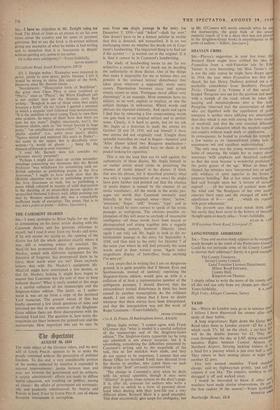SIR,—I have no objection to Mr. Enright using my book
The Mask of Siam as an excuse to air his own views about the country and his sense of personal grievance. But to say the book is ill-written without giving any examples of what he thinks is bad writing and to complain that it is 'inaccurate in details' without quoting any, seems to me unfair.
Or is this mere catchpenny?—Yours faithfully,
DAVID BARNETT
52 Cathcart Road, South Kensington, SW 10 [D. J. Enright writes : 'Examples were removed in proof, partly to save space, partly because I felt it would be wrong to stress this aspect of the book. However, since Mr. Barnett insists. . . . 'Inaccuracies: "Himayanan form of Buddhism"; the great river Chao Phya is once rendered as "Phyra," once as "Phaya"; the White Elephant cult is not extinct (nor are the Siamese cats). Bad writing : "Bangkok is one of those cities that easily becomes a habit" (in my review I quoted a sentence in which a singular verb followed four nominatives); "It is the ambition of most young Thais to own their own samlors. So many of them have that there are now far too many" (highly inaccurate, too !); the tiresome elichds, such as "her breast heaved in huge pants," "arr antediluvian steam-roller," "a grotesque phallic symbol" (i.e., some poor man's dhoti); "figUres stirred and muttered like souls in Hades"— the scene in the opium den is dreadfully over- written—"a world of ghosts . . . hung by the thinnest of threads to even existence."
'I trust Mr. Barnett does not consider my grievance merely personal? 'Perhaps I might also clear up certain misunder- standings concerning my statement that the British Professor "was withdrawn for committing such un- British activities as publishing poems in the New Statesman." I ought to have made clear that the (British) objection was not to publishing poems in the New Statesman as such, but to. publishing a poem which referred in accents of mild deprecation to the shooting of an unspecified person against an unspecified National Library wall, while pointing out that by Western standards this was a remarkably inefficient mode of execution. The poem, that is to say, was a political poem.'—Editor, Spectator.]














































 Previous page
Previous page